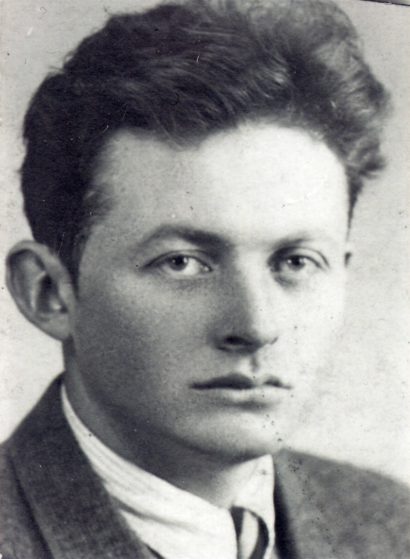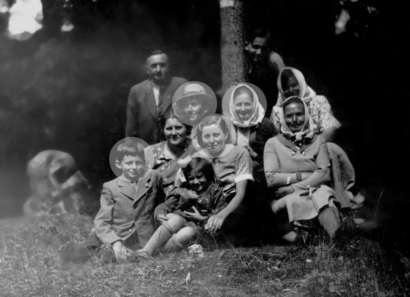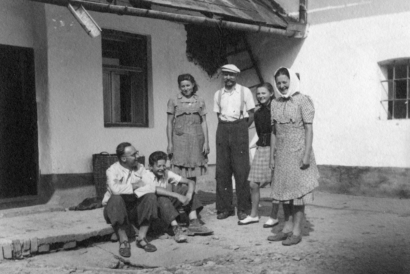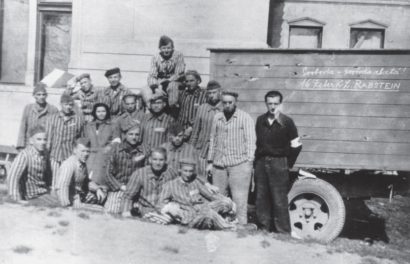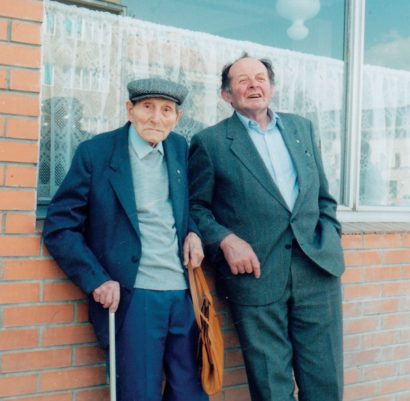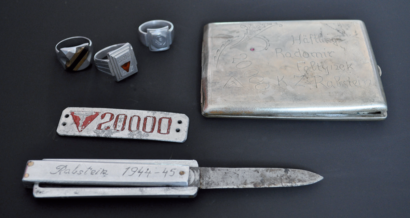Radomír Faltýnek
born April 24, 1926
![]()
Radomír Faltýnek, 1948 (private collection)
An Unusual Friendship
Radomír Faltýnek grew up in the Moravian village of Ochoz, near Olomouc. In March 1939, the region was occupied by the Germans and incorporated into the “Reich Protectorate of Bohemia and Moravia.” The entire Faltýnek family was active in the Czech resistance. The Gestapo tracked them down, and arrested Radomír Faltýnek’s father in 1942. In spring 1944, Radomír, his mother, and his sister were also arrested.
![]()
Radomír Faltýnek (front left) with his parents and his sister (highlighted) at a family excursion to Javorˇicˇko, 1939 (private collection)
![]()
Radomír Faltýnek (second from left) with his sister (third from left) and his mother (right) on the family farm, 1943 (private collection)
František Kruš, a resistance fighter who was disguised as a farmhand and hidden at the family farm, is at the center. After his discovery in 1944, Radomír, his sister and his mother were arrested. František Kruš and Radomír Faltýnek’s parents were killed.
17-year-old Radomír was first sent to several Gestapo jails before being deported to the Dachau concentration camp. In August 1944, he was transferred to the Flossenbürg subcamp of Rabstein in northern Bohemia. The prisoners at Rabstein worked as forced laborers for the Weserflug armaments company, which transferred its production facilities below ground to escape Allied bombing attacks. After performing extremely hazardous labor digging tunnels and building barracks, Radomír Faltýnek obtained a transfer to work as a mechanic in the aircraft factory. Hunger, cold and disease were the order of the day. The solidarity among the prisoners in the face of their suffering remains Radomír Faltýnek’s only positive memory of this time. In May 1945, the SS guards evacuated the camp and herded the prisoners toward the west. However, ongoing Allied strafing attacks soon interrupted their journey. When the news of the war’s end arrived, the SS abandoned the group and the prisoners were finally liberated.
![]()
Radomír Faltýnek (seated at the top) on the way home from Rabstein, May 8, 1945 (private collection)
After liberation, Radomír Faltýnek joined a group of Czech prisoners on the way to Prague. The inscription on the truck reads “Freedom – Sweet freedom! 16 zebras from the Rabstein concentration camp.”![]()
Radomír Faltýnek (highlighted) with fellow Czech prisoners (including Karel Snášel, far right), shortly after liberation in Roudnice nad Labem, May 9, 1945 (private collection)
Radomír Faltýnek succeeded in making his way to Prague. On his way to his home village, he discovered that his parents had been hanged in jail shortly before the end of the war. Radomír Faltýnek and his sister Ludmila were left with only two farewell letters, written by their parents before their death. 19-year-old Radomír took over the family farm, married, and had children. As a landowner, he soon became the target of harsh repression in Communist Czechoslovakia. In 1960, he was forced to turn over his land and join the state agricultural cooperative. After the Communist collapse in 1989, the land was returned to his family.
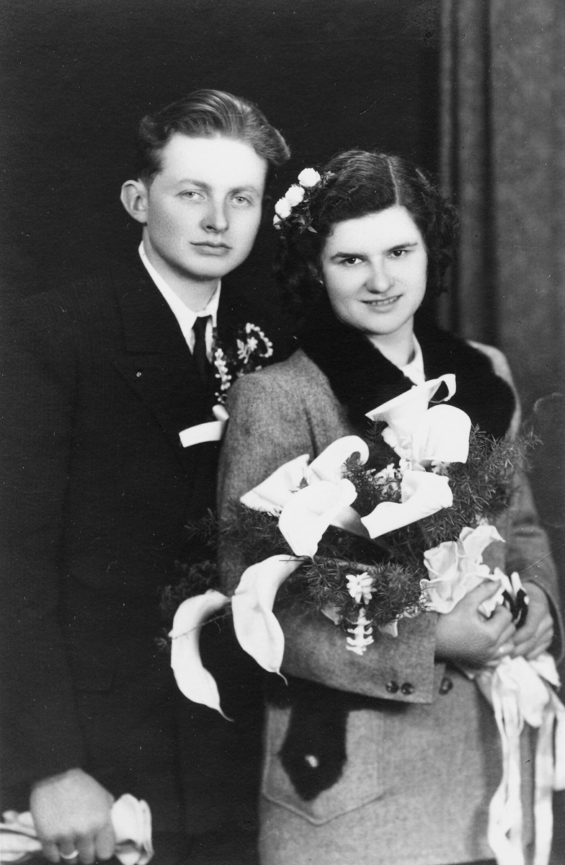
Wedding of Radomír Faltýnek and Anežka Pavlíková, 1949 (private collection)
![]()
Radomír Faltýnek (right) with fellow former prisoner Karel Snášel, 1995 (private collection)
![]()
Mementos belonging to Radomír Faltýnek of his incarceration in the Rabstein concentration camp (private collection)
During his time in the camp, Radomír Faltýnek was able to make small objects out of metal used to produce aircraft for the Weserflug armaments company, and exchange them for food. He has kept several rings, a knife, and a badge as mementos. The badge depicts his prisoner number – the number 20,000 – along with a red triangle and the letter T, which stood for the Czech prisoners. The thin, inscribed case was a gift from a fellow prisoner.
